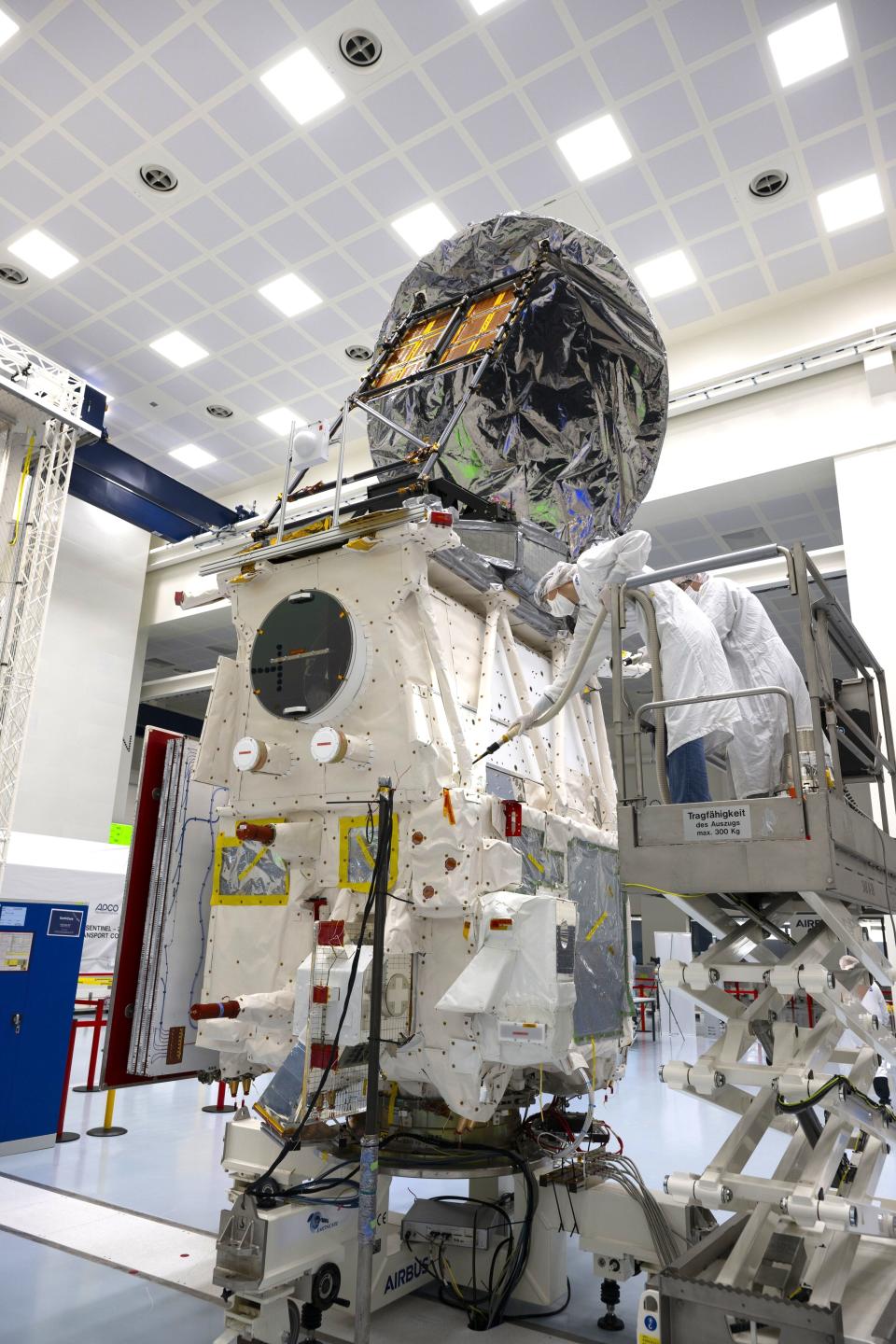Satellite that aims to study how clouds affect Earth’s climate set for launch
A satellite that aims to study clouds to make more accurate weather forecasts and reliable climate predictions is gearing up for launch.
EarthCARE is due to blast off into space on one of Elon Musk’s SpaceX rockets from the Vandenberg Space Force Base in California.
Its mission is to collect as much information as possible on clouds, including aerosols such as dust and smoke that play a role in cloud formation.
.@esa's #EarthCARE satellite being encapsulated with in the SpaceX Falcon 9 rocket fairing, which protects the satellite during the first stages of launch.
One last look😍📸 @SpaceX pic.twitter.com/nukV7DFBwx
— ESA Earth Observation (@ESA_EO) May 27, 2024
The satellite will also measure the radiation emitted from Earth’s surface and atmosphere.
Many of its components, including the main structure and two key instruments, were built in the UK.
Data from EarthCARE – which stands for Earth Cloud Aerosol and Radiation Explorer – could help in mitigating the threats posed by global warming, experts say.
It is the brainchild of Professor Anthony Illingworth, from the University of Reading, who first conceived the idea more than 30 years ago.
The project was adopted by the European Space Agency (ESA) in 2004, and later became a joint mission with the Japanese space agency, Jaxa.
It is scheduled for launch no earlier than May 28 on a Falcon 9 rocket.

Prof Illingworth, who is professor of atmospheric physics at the University of Reading, said it is a “humbling and thrilling experience to be part of something so significant”.
He said the EarthCARE data will help policymakers “make more informed decisions about how to mitigate and adapt to the challenges posed by a warming world”.
Clouds play a vital role in controlling the temperature of the planet by reflecting sunlight back out to space and trapping heat.
But little is known about how it drives the Earth’s climate system.
The three-year mission, which cost more than 800 million euros (£680 million), is expected to provide answers.
The UK Space Agency (UKSA) contributed around 120 million euros (£102 million) in funding towards the mission, over a period of 20 years.
The satellite weighs just over two tonnes (2,200kg) and measures a little over 17m (56ft) in length.
On board are four instruments that will analyse clouds and their structures in detail, take images, as well as measure how much heat from the Sun is being trapped by clouds.
Surrey Satellite Technology (SSTL) developed the satellite’s MSI (multi-spectral imager) instrument, which comes with two cameras, while space manufacturer Thales Alenia Space UK supplied the broadband radiometer instrument, which will provide measurements of the reflected solar and emitted heat radiation.
Household duties for the #EarthCARE team in California!
The team has been busy prepping @esa's next Earth Explorer satellite for launch – one of the activity includes carefully cleaning the spacecraft 🧹🛰️
In order to properly assess the cleanliness, the lights in the… pic.twitter.com/znlzbhFSQ5
— ESA Earth Observation (@ESA_EO) May 2, 2024
Airbus Defence and Space UK was responsible for building EarthCARE’s base platform.
Dr Ralph Cordey, head of Earth Science at Airbus Space Systems UK, said: “EarthCARE is an important new European Space Agency mission to study how clouds and dust particles affect the way that heat is transported through the Earth’s atmosphere.
“It takes a vital step in reducing uncertainty about how the greenhouse effect works and will improve predictions of how climate change will warm the Earth.
“With its payload of four instruments – two developed in the UK – and carried on a satellite platform built by Airbus at Stevenage – EarthCARE will fill one of the remaining gaps in our knowledge of our warming planet.”
Other UK collaborators include The National Centre for Earth Observation (NCEO), the Universities of Oxford and Leicester, Imperial College, and the National Centre for Atmospheric Science.
Once launched, EarthCARE will circle Earth every 90 minutes at an altitude of around 400km (250 miles).
It will cross the equator in the early afternoon to optimise daylight conditions, ESA said.


